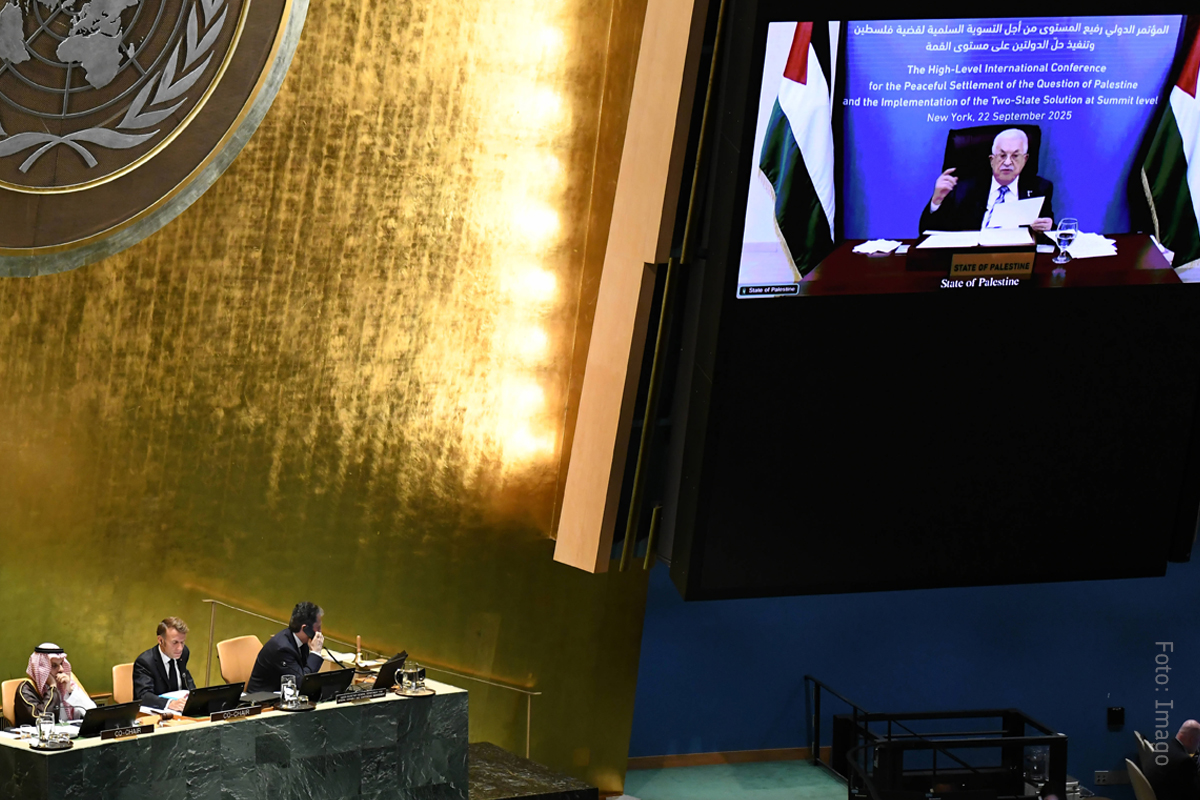“Mind games regarding the resettlement of the Gaza Strip harm Israel immensely”

Yossi Klein Halevi in an interview about the goals and motives of the far right in Israel’s government – and why the decision whether to exempt the ultra-Orthodox from military service could lead to the fall of the coalition.
Yossi Klein Halevi was born in New York in 1953. He is the author of the bestseller “Letters to My Palestinian Neighbor” and publishes in Israeli and US magazines. At the Shalom Hartman Institute in Jerusalem, he heads the Muslim Leadership Initiative, which aims to deepen connections between North American Muslims and Jews. Most recently, he also took part in the protests against the planned judicial reform. Together with Donniel Hartmann, Klein Halevi hosts “Israel at War” as part of the “For Heaven’s Sake” podcast series, availibleon Spotify and other platforms.
In a conference taking place in Jerusalem at the end of January, several government ministers and coalition lawmakers pledged to rebuild Jewish settlements in the Gaza Strip and were celebrated by an enthusiastic audience. What’s the cultural and political significance of that plegde?
It’s enormously destructive. Amidst the war with Hamas, Israel faces several threats. That includes the external threat of a growing movement that seeks to declare the Jewish state the arch-criminal among nations. But there are also internal threats: coming from far-left Jews, living mostly in the diaspora, who support the effort to criminalize Israel as well as from far-right Jews, mostly in Israel, fantasizing about returning to Gaza. The intentions, actions, and rhetoric of the latter seemingly validate the worst accusations against us and harm what’s left of Israel’s good name abroad.
The far-right fantasies are also enormously destructive to the internal dynamics of Israeli society. If liberal Israelis felt that in the end, this is a war to rebuild settlements in Gaza, we would stop supporting war, stop sending our kids to fight and stop fighting ourselves. To be clear: That is far from the case. Because Israelis understand that the goals of this war are strategic and rational – and not messianic fantasy. But, unfortunately, much of the international community doesn’t understand.
So, how likely is it that the far-right plans become reality?
It’s not going to happen. Neither do most of the Israelis support that nor would the international community, especially our allies, accept it. But the damage that far-right does is incalculable. In the middle of the most brutal and most necessary war that Israel has ever fought, the last thing we need to do is to deal with the fantasies of the far right and its supporters within the Likud.
What exactly do the radical coalition partners of Netanyahu’s government desire?
The coalition encompasses a range of parties. I would certainly put Shas, the Mizrahi ultra-orthodox party, outside of that far right constellation. They tend to be a little more moderateon political issues, being mainly concerned with maintaining the ultra-Orthodox separatist community. I would have said the same thing about the Ashkenazi ultra-orthodox party, United Torah Judaism. But there has been a certain radicalization, creating two camps in that party, with a minority supporting the abovementioned conference or Gaza settlement.
What about Bezalel Smotrich, head of the Religious Zionism party and Minister of Finance,and Itamar Ben ‑Gvir, leader of Jewish Power party serving as Minister of National Security?
They want Israel to declare that there is no chance of an agreement with Palestinians ever. That the whole land belongs to us not only by right, but also in practice. Most Israelis would agree that the land belongs to the Jewish people by right. But they would also agree that there is another people in that land that we need to come to terms with.
On the far right, however, there is no other people in that line – and, thus, no moral dilemma. Instead, they emphasize our strength and resoluteness and declare the world around us being irrelevant because everybody would hate us anyway – as if there were no of allies on our side. Ultimately, the real goal of the far right is to “do whatever needs to be done.” That’s aeuphemism for effectively expelling the Palestinians.
Do Ben-Gvir, Smotrich, and other proponents of the resettlement in Gaza consider any constraints of realpolitik and, effectively, moderate their plans?
I would draw a small distinction: Smotrich is more rational and more patient, and he seems to believe to be more statesman-like. Ben-Gvir, however, is a thug, behaving without any strategic sophistication. Look, what’s that play here is messianic ideology, declaring that now is the time of the Messiah. That implies the idea that the Jewish people needs to defy the world, can trust only in God, and must not only protect itself against its enemies but destroy them. It’s a kind of Jewish version of radical Islamism, like the radical Shiism being embedded in the Iranian regime, believing in the destruction of Israel as a necessary pre-requisite for the return of the Messiah.
Can you exemplify that by the specific language the far-right Jewish messianists use?
They constantly speak about Amalek. Historically, Amalek is the ancient tribe that attacked the children of Israel when they left Egypt and tried to destroy them. In the Jewish imagination, Amalek became a mythic archetype for a deadly enemy that must be wiped out. For many Jews of the Holocaust generation, including me as a son of a Holocaust survivor, Germany represented Amalek. That equation was a mere fantasy, a Jewish self-defence and coping mechanism.
Applying the mythical figure of Amalek to the Palestinians, however, is very dangerous. Because we have power over them. Undoubtedly, on October 7, Hamas fulfilled everything that Jews have always imagined about Amalek. But we have a moral responsibility to draw a clear distinction between Hamas and the Palestinian people – even if many Palestinians themselves don’t draw that line. I don’t think most Israelis see Palestinians as representing Amalek. It’s very much restricted to the mindset of the radical right.
Within the current coalition, what power and leverage does the messianic far-right have to push forward their ideas?
The far right is part of the government but not part of the war cabinet. For all practical purposes, they have no say in how this war is being fought. And that’s the actual reason for why they have staged that conference in January. It’s absurd having political parties that are part of the government acting as if they’re the opposition.
In contrast, how would you describe the people in the war cabinet?
As moderate. They’re very hawkish but reasonable. I’m thinking of Minister of Defence Yoav Galant and certainly the leading opposition figure Benny Gantz who joined the war cabinet to help moderate this government. Prime Minster Netanjahu has used the notion of Amalek immediately after October 7 but referred to Hamas only. Nevertheless, this notion and the far-right religious language are foreign to him. Even he is not in for rebuilding settlements in Gaza. The war in Gaza is a mainstream war supported by the overwhelming majority of Israeli’s who trust both the war cabinet and the army.
To forge and keep his coalition, inaugurated in January 2023, however, Netanyahu gave the far-right a lot of power and attention.
Netanjahu has given the far-right more power than it ever had. It’s a historic scandal that Ben-Gvir oversees the Israeli police. As finance minister, also Smotrich has been put in a very powerful position. Not having an impact on the Gaza war made them very frustrated.
So, Ben-Gvir has threatened to bring the government down more than once. Undoubtedly, he will run in the next election. Not against the left and the center, but against the Likud and Netanjahu. He will say that if he was in charge, he would have finished the war quickly and decisively, with Netanjahu and the Likud are sell-outs only pretending to be right-wingers. Ben-Gvir is looking to unseat the mainstream right.
How did the democracy movement, fighting against the attempted judicial coup before October 7, react to the fantasies of resettlement in Gaza?
By ignoring it. That was right because these fantasies are completely irrelevant. But what is not irrelevant is Ben-Gvir overseeing the police and Smotrich in charge of the budget and in charge of settlement expansion in the West Bank. Those are issues of concern, certainly to the democratic movement. But for tactical purposes, the movement is really focusing on bringing the government down and holding elections.
How likely are the coalition’s resignation and elections to happen?
An important date to watch is March 31. That’s the date when the Knesset is going to have to vote on whether to extend the wholesale military exemption for the ultra-Orthodox. My guess is that the government will not be able to pass that bill because there will be a revolt within parts of the coalition.
When you have hundreds of thousands of young people fighting in a war, it’s very bad timing for Netanjahu to try to hold his coalition together by continuing that military exemption thathas been criticized for a long time anyway. So, if that bill doesn’t pass and the army beginsthe process of drafting ultra-orthodox young men, both ultra-orthodox parties, Shas and United Torah Judaism, will almost certainly break up from the coalition. The current government will fall.
What chances would the opposition have in new elections?
I think the current opposition will win by a landslide. That’s what all the polls show. That’s the sentiment in the country. People are so fed up with this government. Other governments fell for far less offenses that this government has done to the country.
The interview was conducted on March 11, 2024 and reviewed for timeliness on March 14.
![]()
Hat Ihnen unser Beitrag gefallen? Dann spenden Sie doch einfach und bequem über unser Spendentool. Sie unterstützen damit die publizistische Arbeit von LibMod.
Spenden mit Bankeinzug
Spenden mit PayPal
Wir sind als gemeinnützig anerkannt, entsprechend sind Spenden steuerlich absetzbar. Für eine Spendenbescheinigung (nötig bei einem Betrag über 200 EUR), senden Sie Ihre Adressdaten bitte an finanzen@libmod.de
Verwandte Themen
Newsletter bestellen
Mit dem LibMod-Newsletter erhalten Sie regelmäßig Neuigkeiten zu unseren Themen in Ihr Postfach.





